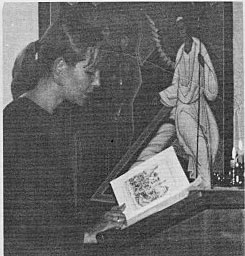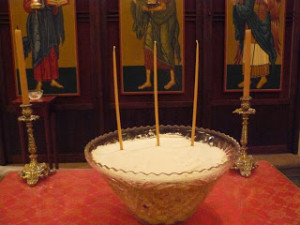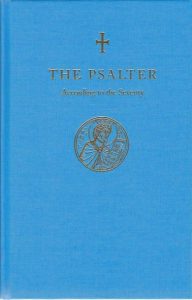As I continue re-publishing this series from the archives of the Evangelist, the print-only newsletter of St. John Orthodox Church during the 1990s and 2000s, I have added a few photos and  links that were not in the newsletter. This article is timely as we at St. John now have “Psalter groups” that read the Psalms during Great Lent, and as we also pray the Psalter at home for 40 days following the recent death of a parishioner.
links that were not in the newsletter. This article is timely as we at St. John now have “Psalter groups” that read the Psalms during Great Lent, and as we also pray the Psalter at home for 40 days following the recent death of a parishioner.
Also, we are praying memorial prayers for three parishioners at St. John today—for Luke Heisig (40 days), Damon Boiles, Jr. (one year), and Mary Clark (four years). And so the koliva—the boiled wheat—will be offered in their memory.
In this photo from this article in the Evangelist, Katherine Thames is reading the Psalter during the vigil preceding Rose Nash’s funeral on November 18, 2000. Katherine is one of my Goddaughters, as is Rose Nash.
The Healing Power of . . . Psalms, Prayer, and Wheat
From the Evangelist (January/February 2001)
By Kh. Marye Cushman (my saint’s name, for Mary of Egypt)
Orthodox Christians should be experts on the Psalms. We have so many opportunities to make them a part of our daily lives. They are read at every service of the Church, from the daily services at the various hours, to Vespers, and especially in Orthros and the Divine Liturgy. As the Introduction to The Psalter According to the Seventy, published by Holy Transfiguration Monastery, says:
“Of old, many monastics learned the Psalter by heart, and there is an ancient local canon which required that those who were to be consecrated bishops should know the Psalter from memory. Many are those Orthodox Christians, monastics, and lay people, even among the most illiterate peasants, who know many of the Psalms by heart, especially those that are chanted again and again in church . . . . How blessed it would be if the English-speaking Orthodox followed this soul-profiting example and learned to recite and chant, if not the entire Psalter, at least some portion of the more frequently used Psalms!”
Lay persons who visit monasteries will quickly appreciate the cycle of reading the entire Psalter during each liturgical week. But perhaps the event which brings the healing power of the Psalms most tangibly into the lives of Orthodox Christians is death. As Nikolaos Vassiliadis says in his book, The Mystery of Death:
“From earliest Christian times, psalms and hymns were sung to our life-giving God when a believer died. But the basic parts of the Funeral Service still in use today can be traced mainly to the fifth century. With the passage of time the Service has been enriched with Psalms, hymns, and songs so that it evolved into the richest, most versatile, most dramatic and most impassionate of all the services of our Church . . . . In the readings and hymns of the Funeral Service a dramatic dialogue takes place between the priests, the relatives, the friends of the deceased and the deceased himself. The vanity of worldly things is emphasized and the incomparable value of the eternal blessings of the future kingdom is praised. At the same time in a lyric manner and with a contrite spirit priests and people invoke the infinite mercy of the Almighty God for the departed.”
Not only is the Funeral Service itself full of Psalms, but there is also the wonderful tradition of reading the Psalter during the vigil which precedes the funeral and usually lasts at least overnight. The Psalter is read in groups of Psalms called Kathismas. At the end of each kathisma, the following prayer is recited on behalf of the deceased:
“Remember, O Lord our God, Thy servant our brother (sister) Name, departed in the faith and hope of eternal life, his (her) transgressions, both voluntary and involuntary, delivery him (her) from eternal torment and the fire of Gehenna, and grant him (her) to partake of Thine everlasting good things, prepared for them that love Thee. If he (she) hath sinned, yet he (she) hath not forsaken Thee, and hath believed firmly in Thee, God the Father, the Son, and the Holy Spirit glorified in Trinity, and he (she) hath in Orthodox manner confessed the Uninty in Trinity and the Trinity in Unity even unto his (her) last breath. Therefore be merciful unto him (her) and received his (her) faith in Thee in place of works; and as One compassionate grant him (her) rest with the Saints, for no man can live and not sin; but Thou alone art without sin, and Thy righteousness is unto the ages; for Thou alone art a God of mercies and compassion and love for man, and to Thee do we wend up glory, to the Father, and to the Son, and to the Holy Spirit now and ever, and unto the ages of ages. Amen.”
It is also traditional for those who were close to the deceased to continue to read the Psalter privately at home for forty days following their beloved one’s death, including the reading of the above prayer after each Kathisma. Why do we do this? Again, from The Mystery of Death:
“We are informed by many witnesses in Church History and Tradition that there exists a mutual spiritual communion, support, solidarity, an help, through love and prayer among the members of the triumphant and the militant Church, for together we all constitute one communion of saints. Those who have died and those who still live in this world are in a mystical and supernatural communion of life and prayer and brotherly love.”
Our relationship with our beloved departed friends and relatives doesn’t end with their physical death! The forty day reading of the Psalter is one of the Church’s “tools” for strengthening the love between the “living” and the dead.”
This love and relationship is also strengthened through the Memorial Prayers for the Dead. Again quoting from The Mystery of Death:
“Because our love remains, our Mother Church has, from the very beginning, established the practice of saying special prayers for those who have fallen asleep, and on certain specified days it has memorials for them . . . . The Apostolic Constitution recommends that the Memorials for the dead be served with psalms and readings and prayers on the third day after the death of our beloved one, on account of the Lord Jesus who rose after three days. They also prescribe Memorials on the ninth day as a reminder of the living and of the dead, as well as on the fortieth day after death according to ancient practice.”
With the recent death of our sister in the Lord, Rose Elizabeth Nash (November 17, 2000) we were blessed to once again participate in the vigil with the reading of the Psalter and in the glorious Funeral Service at St. John on November 18. The following day, November 19, prayed the three-day Memorial prayers. And again on November 25, the nine-day Memorial prayers, this time sharing kollyva (boiled wheat) together afterwards. (The forty-day Memorial will fall around December 26.) For more information about the kollyva we once again consult The Mystery of Death:
“The kollyva . . . conceal a profound and most didactic sybolism. They symbolize the resurrection from the dead of the bodies. They remind us that man, too, is a seed that is at death buried in the earth as is the seed of wheat. This seed will be resurrected again by the power of God. For this reason, as St. Symeon of Thessaloniki observes, in the kolyva we add various other seeds (raisins, walnuts, almonds, etc.). But the basic element is always wheat because the Savior himself likened His All-holy Body ad His Resurrection to wheat, saing ‘Unless a grain of wheat falls into the earth and dies, it remains alone; but if it dies, it bears much fruit (Jn. 12:24).’”
Thank God for these healing gifts given to us by the Church in Her wisdom to help us express our love for the departed. Psalms, Prayers, and Wheat—Memory Eternal!

